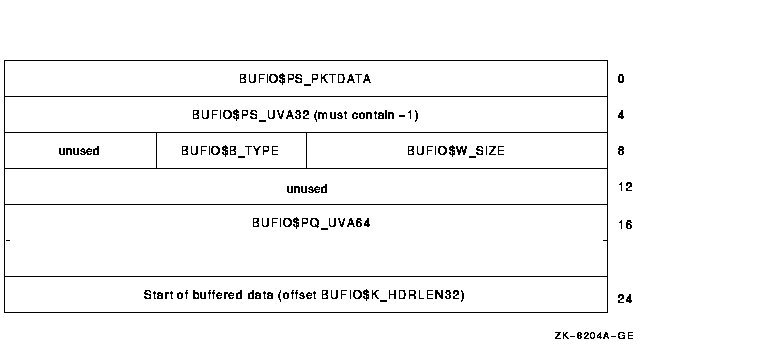 |
HP OpenVMS systems documentation |
| Previous | Contents | Index |
Drivers written in C use the ini_fdt_act macro to initialize an FDT entry for an I/O function. This macro uses the DRIVER$INI_FDT_ACT routine. Both the macro and the routine have been enhanced for OpenVMS Alpha Version 7.0.
The format of the macro in releases prior to OpenVMS Alpha Version 7.0 was:
ini_fdt_act (fdt, func, action, bufflag) |
where the bufflag parameter must be one of the following:
| BUFFERED | The specified function is buffered. | |
| NOT_BUFFERED | The specified function is direct. This is a synonym for DIRECT. | |
| DIRECT | The specified function is direct. This is a synonym for NOT_BUFFERED. |
The use of the bufflag parameter has been enhanced to include the declaration of 64-bit support by allowing 3 additional values:
| BUFFERED_64 | The specified function is buffered and supports a 64-bit address in the p1 parameter. | |
| NOT_BUFFERED_64 | The specified function is direct and supports a 64-bit address in the p1 parameter. | |
| DIRECT_64 | The specified function is direct and supports a 64-bit address in the p1 parameter. |
If a driver does not support a 64-bit address on any of its functions, there is no need to change its use of the ini_fdt_act macro.
For example, the following C code segment declares that the IO$_READVBLK and IO$_READLBLK functions support 64-bit addresses.
ini_fdt_act (&driver$fdt, IO$_SENSEMODE, my_sensemode_fdt, BUFFERED); ini_fdt_act (&driver$fdt, IO$_SETMODE, my_setmode_fdt, BUFFERED); ini_fdt_act (&driver$fdt, IO$_READVBLK, acp_std$readblk, DIRECT_64); ini_fdt_act (&driver$fdt, IO$_READLBLK, acp_std$readblk, DIRECT_64); |
The interpretation of the
bufflag
parameter to the DRIVER$INI_FDT_ACT routine has been enhanced to
support the new values and the setting of the 64-bit support mask in
the FDT data structure.
4.4.2 Drivers Written in MACRO-32
As of OpenVMS Alpha Version 7.0, drivers written in MACRO-32 use a new FDT_64 macro to declare the set of I/O functions for which the driver supports 64-bit addresses. The use of the FDT_64 macro is similar to the use of the existing FDT_BUF macro. If a driver does not support a 64-bit address on any of its functions, there is no need to use the new FDT_64 macro.
For example, the following MACRO-32 code segment declares that the IO$_READVBLK and IO$_READLBLK functions support 64-bit addresses.
FDT_INI MY_FDT FDT_BUF <SENSEMODE,SETMODE> FDT_64 <READVBLK,READLBLK> FDT_ACT ACP_STD$READBLK, <READVBLK,READLBLK> |
As of OpenVMS Alpha Version 7.0, drivers written in BLISS-32 and BLISS-64 use a new optional keyword parameter, FDT_64, to the existing FDTAB macro to declare the set of I/O functions that support 64-bit addresses. The use of the new FDT_64 parameter is similar to the use of the existing FDT_BUF parameter. If a driver does not support a 64-bit address on any of its functions, there is no need to use the new FDT_64 parameter.
For example, the following BLISS code segment declares that the IO$_READVBLK and IO$_READLBLK functions support 64-bit addresses.
FDTAB (
FDT_NAME = MY_FDT,
FDT_BUF = (SENSEMODE,SETMODE),
FDT_64 = (READVBLK,READLBLK),
FDT_ACT = (ACP_STD$READBLK, (READVBLK,READLBLK) )
);
|
Table 4-2 summarizes the I/O mechanisms that support 64-bit addresses.
| Mechanism | 64-Bits | Comments |
|---|---|---|
| Simple buffered I/O | Yes | 32/64-bit BUFIO packet headers |
| Complex Buffered I/O | No | Used by XQP and ACPs |
| Complex Chained Buffered I/O | Yes | New cells in CXB |
| Direct I/O | Yes | Cross-process PTE problem |
| LAN VCI | Yes | Cross-process PTE problem |
| VMS I/O Cache | Yes | 64-bit support is transparent to other components |
| Buffer Objects | Yes | Special case of direct I/O |
| Diagnostic buffers | Yes | Driver-wide attribute |
Figure 4-1 shows a 32-bit buffered I/O packet header.
Figure 4-1 32-Bit Buffered I/O Packet Header

| BUFIO$PS_PKTDATA | Contains pointer to buffered data in packet |
| BUFIO$PS_UVA32 | Contains 32-bit user virtual address |
MOVAB 12(R2),(R2)
|
A 64-bit buffered packet header is as shown in Figure 4-2.
Figure 4-2 New 64-Bit Buffered I/O Packet Header

| BUFIO$PS_PKTDATA | Contains pointer to buffered data in packet |
| BUFIO$PS_UVA32 | Must contain BUFIO$K_64 (-1) value |
| BUFIO$PQ_UVA64 | Contains 64-bit user virtual address |
| Previous | Next | Contents | Index |